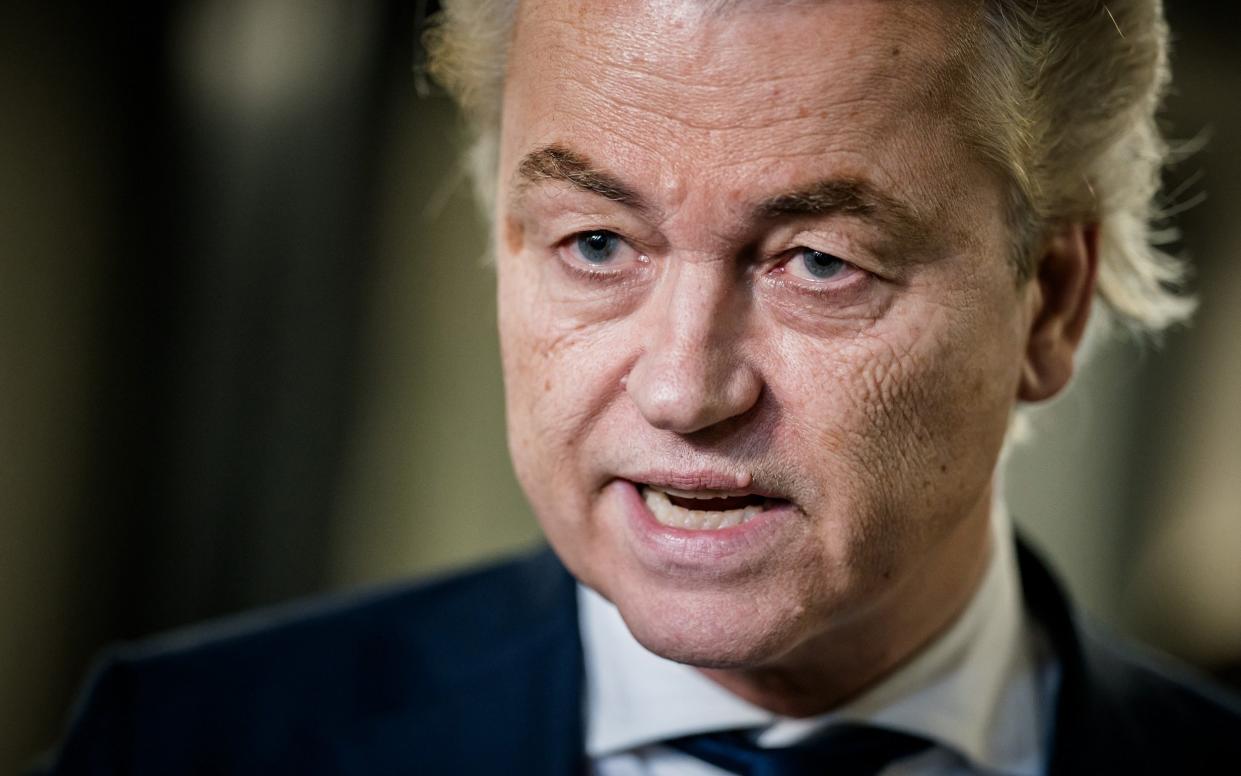Europe’s Right-wing revolt has begun – only Britain will miss out

- Oops!Something went wrong.Please try again later.
Six months ago the Netherlands was the latest European country to see a major breakthrough for the populist Right. In the general election the anti-immigration Party for Freedom (PVV) became the largest party in the Dutch Parliament, with a quarter of the seats. (Dutch politics is notoriously fragmented).
Two days ago a new government, at last, was formed. The leader of the PVV, Geert Wilders, will not be Prime Minister, but he and his party will be the senior party in a coalition with another populist party, the Farmer-Citizens (BBB) and two parties of the centre-Right, the New Social Contract (NSC) and the Dutch Liberal party the VVD. They are promising the toughest immigration system anywhere.
This shows not just a shift to the Right overall in Dutch politics, but an even more significant movement within the broader European Right. It is the national populists who are now the dominant force, replacing Christian Democrats and Right Liberals.
The Netherlands is just the most recent example of this kind of movement. The size of the populist upsurge and its spread across most of the EU will almost certainly be confirmed in the European Parliament elections in June. According to polls, Right populist parties will make gains in every country, at the expense of Greens and the Left. They are projected to come first in nine countries (Austria, Belgium, Czechia, France, Hungary, Italy, Netherlands, Poland, and Slovakia) and come second or third in another nine (Bulgaria, Estonia, Finland, Germany, Latvia, Portugal, Romania, Spain, and Sweden).
This rise in populism is leading to electoral breakthroughs or gains in one country after another (Poland is the major exception where the centre-Left has recently regained power). In the next few years it will almost certainly reach the two core countries, with victory for the National Rally (RN) in France and the Alternative for Germany (AfD) joining a government coalition there.
Given this, what impact if any will this tectonic political shift in Europe have on British politics? I have already argued that the evolution of European politics will produce a sudden shift in sentiment and attitudes within UK politics. Simply, the centre-Left will stop having support for the EU and the European project as one of its defining features. Instead the UK left will, I believe, become Eurosceptic and hostile to the direction of EU politics.
For a long time and particularly since the 2016 Brexit referendum, the British Left has seen the EU and European politics more generally as the embodiment of a left-Liberal kind of politics and values. This is contrasted to the supposed Right-wing and populist turn of British political life, particularly under Boris Johnson. Making the UK. more like Europe and even rejoining the EU has been the goal.
This is becoming ever harder to sustain. The evidence mounts with every election that most of Europe is moving towards exactly the kind of politics that the UK centre-Left abhors. Eventually it will become impossible to deny this. The relationship of the British left with Europe will be like a marriage in which one party desperately tries to ignore or deny the evidence that their partner is becoming something they no longer love or even hate until suddenly realisation comes and love abruptly becomes dislike or even hatred. The turning point might be as soon as the election next month but is more likely to come in a few years, with a decisive turning France or Germany.
What though of the British Right? Will it have a mirror image change and become pro-Europe? This is more complicated. The vote to Leave in 2016 was complex. It was not a vote for a single clear alternative (hence many of the problems that have followed). For some leaving the EU was about following a radical free-market liberal route with the goal of creating a free market national capitalism or ‘global Britain’. People with such beliefs, if they are consistent, will still reject the supranational EU project, even if (as is likely) it takes a populist turn. They will also reject the dirigiste economic policy of the populists.
The other different project and reason for leaving the EU was to assert national identity, to adopt a policy of national economic interventionism, and to do things such as regaining control of borders to tighten immigration controls. If Europe in general moves in that direction then once again aligning with the EU becomes attractive for that kind of politics, as Europe will no longer be identified with Left-liberal cosmopolitanism. Quite the opposite in fact.
The first kind of UK Right has some major figures and a lot of money. The second has far more voters and increasingly also has money. What it lacks so far is organisation. This, though, will change rapidly after the next election here.
European politics is changing its basic orientation before our eyes. This is bound to have an impact on both sides of UK politics, given the centrality of attitudes towards Europe to political identity here. The results will be turbulent and interesting.

